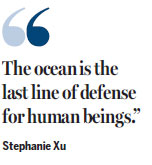
|
Stephanie Xu, is president of US-Asia Innovation Gateway and organizer of Silicon Valley Mayors Trips to China, the third of which is scheduled for November. Provided To China Daily |
Advancing US-China cooperation on preserving, harvesting marine resources
For the past month, Stephanie Xu traveled back and forth between her home in Silicon Valley and Monterey Bay in California. Unlike tourists there, she did not gaze at the wildlife or enjoy the natural beauty but visited local officials, farmers and scientists to find out if the dramatic recovery of the bay could be duplicated in China.
The stunning beauty of Monterey Bay, south of San Jose, the heart of Silicon Valley, hides a history of exploitation. Wild species, like sea otters, whales and sardines, were hunted for profit one after another. From 1935 to 1945, the pollution caused by the growth of the cannery industry put many species at risk of extinction in the region.
Realizing the importance of the marine ecosystem to human development, the local people created an economy based on the health of that ecosystem and tried to find a balance between economics and the environment that allows nature and people to co-exist and thrive.
"No one had expected their efforts led to the 'organic standard' for American agriculture. The preservation of marine resources should give birth to the popular organic agriculture," said Xu, president of US-Asia Innovation Gateway, a Silicon Valley-based organization aimed at advancing economic opportunities and investment between the US and Asia.

"The pollution in the Monterey Bay is likened to the same problems that many Chinese cities are facing now," she said. "We must raise people's awareness that the ocean is the last line of defense for human beings, and we must improve our technical capacity for marine resource exploration through innovation and technology."
China's marine economy exceeds $7 trillion annually and represents more than 10 percent of China's GDP; however, the country faces serious environmental problems relating to the "blue economy", she said, adding that there's great potential for cooperation between China and the Monterey Bay area.
There are more than 30 research centers on marine technology and organic agriculture at Monterey Bay, where an international convention on blue economy is held every year, providing an exchange platform for the world's marine technologies.
Xu said that during her talks with locals, she found that they had a great desire for cooperation with their Chinese counterparts, but the two sides were not able to reach out to each other due to cultural barriers or a lack of resources.
"We aim to realize win-win cooperation through people-to-people exchange, because we find the American people and the Chinese people can get along well with each other," Xu said.
Her organization has recently signed an agreement with the Monterey Bay International Trade Association to introduce agricultural and blue economy projects to China.
One of their many plans is to bring Chinese scientists and enterprises to the annual convention in September in Monterey Bay and then organize trade shows or forums on "Blue Silicon Valley" on both sides in turn.
"Pollution and poverty reduction have become the key words of China's development, as the government aims to lift 55 million rural people out of poverty in the coming five years," said Xu. "Poverty alleviation depends on the balance between economic growth and environmental protection, and that's why we believe there's great potential to develop China's 'blue Silicon Valley', though it may take a long time without immediate economic profit."
Her confidence also comes from the government support of both countries. To advance friendship and business opportunities between Chinese and American cities, the US-Asia Innovation Gateway has organized two trips for Silicon Valley mayors to China since 2014, with support from the Chinese People's Association for Friendship with Foreign Countries and the Chinese Consulate General in San Francisco.
The two trips have taken 10 mayors from Silicon Valley and California state government officials to Beijing, Shanghai, Guangzhou, Shenzhen, Chengdu, Chongqing, Wuhan and Jiangmen, where they visited Chinese high-tech companies and met with local government officials.
The third Chinese trip is scheduled for November and expected to involve 10 Silicon Valley mayors as well as several entrepreneurs and venture capitalists. They will visit Nanjing, Qingdao and Changzhou with the theme of "Innovation, Sustainability and Urban Diplomacy".
"We will focus on second- or third-tier cities in China because they are dynamic and enjoy greater potential of development," Xu said.
"Every city has its own niche area, and we aim to partner them with a Silicon Valley city for them to work on compatible projects," she said. "For instance, Jiangmen is China's backyard of manufacturing, the Yuexiu District of Guangzhou is a biotech center, and Guizhou has just opened the national big data pilot zone.
"There's a certain synergy between Chinese cities and Silicon Valley," she said. "But challenges do exist, such as failure to follow up or build up mutual trust, so promoting friendship is one of our focuses."
As a result of the mayors' trips, Union City, in Silicon Valley, has become a friendship city with China's Changzhou City. Elk Grove, California, is now a friendship city with Guangzhou's Yuexiu District, and Dublin has signed a memorandum of understanding with Changzhou to establish a friendship city relationship.
"The trips not only serve as a bridge for Silicon Valley to understand China but also for China to better understand the Silicon Valley," said Xu. "We believe such communication and exchange will not only benefit economic growth but also promote understanding and friendship between the two peoples."
liazhu@chinadailyusa.com
Zou Shiming to step into ring where 'The Greatest' once reigned